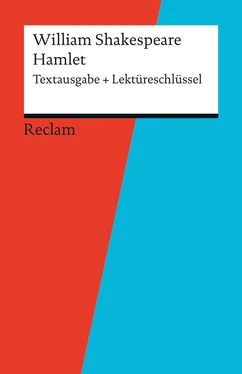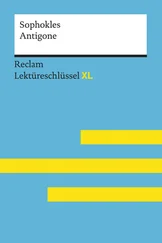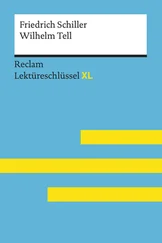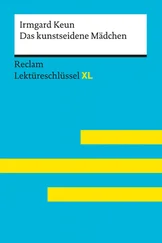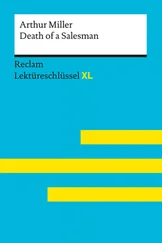A little month, or erethose shoes were old
With which she followed my poor father’s body
Like Niobe, all tears, why she, even she –
O God, a beast that wants discourse of reason
Would have mourned longer – married with my uncle,
My father’s brother, but no more like my father
Than I to Hercules… within a month,
Ere yet the salt of most unrighteoustears
Had left the flushingin her gallèdeyes,
She married. O most wicked speed, to post
With such dexterityto incestuous 28sheets!
It is not, nor it cannotcome to good –
But break, my heart, for I must hold my tongue.
[25] Enter Horatio, Marcellus, and Bernardo.
HORATIO. Hail to your lordship!
HAMLET. I am glad to see you well –
Horatio, or I do forget myself!
HORATIO. The same, my lord, and your poor servant ever.
HAMLET. Sir: my good friend, I’ll changethat name with you.
[They clasp hands.]
And what make you fromWittenberg, Horatio? –
Marcellus!
[Gives his hand.]
MARCELLUS. My good lord!
HAMLET. I am very glad to see you –
[To Bernardo] good even, sir.
[To Horatio.]
But what, in faith, make you from Wittenberg?
HORATIO. A truant disposition, good my lord.
HAMLET. I would not hear your enemy say so,
Nor shall you do my ear that violence
To make it trusterof your own report
Against yourself. I know you are no truant,
But what is your affair in Elsinore?
We’ll teach you for to drink ere you depart.
HORATIO. My lord, I came to see your father’s funeral.
HAMLET. I prithee, do not mock me, fellow-student,
I think it was to see my mother’s wedding.
HORATIO. Indeed, my lord, it followed hardupon.
[26] HAMLET. Thrift, thrift, Horatio, the funeral baked meats
Did coldly furnish forth the marriage tables.
Would I had metmy dearest foein heaven
Or everI had seen that day, Horatio –
My father, methinksI see my father.
HORATIO. Where, my lord?
HAMLET. In my mind’s eye, Horatio.
HORATIO. I saw him once, ’a was a goodlyKing …
HAMLET. ’A was a man, take him for all in all,
I shall not look upon his like again.
HORATIO. My lord, I think I saw him yesternight.
HAMLET. Saw, who?
HORATIO.. My lord, the King your father.
HAMLET. The King my father!
HORATIO. Seasonyour admirationfor a while
With an attentear, till I may deliver,
Upon the witness of these gentlemen,
This marvel to you.
HAMLET. For God’s love let me hear!
HORATIO. Two nights togetherhad these gentlemen,
Marcellus and Bernardo, on their watch
In the dead wasteand middle of the night,
[27] Been thus encountered: A figure like your father,
Armèd at point exactly, cap-a-pe,
Appears before them, and with solemn march
Goes slow and statelyby them; thrice he walked
By their oppressedand fear-surprisèdeyes
Within his truncheon’s length, whilstthey, distilled
Almost to jelly withthe actof fear,
Stand dumb and speak not to him. This to me
In dreadful secrecyimpart they did,
And I with them the third night kept the watch,
Where, as they had delivered, both in time,
Form of the thing, each word made true and good,
The apparition comes: I knewyour father,
These hands are not more like.
HAMLET. But where was this?
MARCELLUS. My lord, upon the platform where we watch.
HAMLET. Did you not speak to it?
HORATIO. My lord, I did,
But answer made it none; yet once methought
Itlifted up it head, and did address
[28] Itself to motion like asit would speak;
But even thenthe morning cock crew loud,
And at the sound it shrunk in haste away
And vanished from our sight.
HAMLET. ’Tis very strange.
HORATIO. As I do live, my honoured lord, ’tis true,
And we did think it writ down in our duty
To let you know of it.
HAMLET. Indeed, indeed, sirs, but this troubles me.
Hold you the watch to-night?
ALL. We do, my lord.
HAMLET. Armed, say you?
ALL. Armed, my lord.
HAMLET. From top to toe?
ALL. My lord, from head to foot.
HAMLET. Then saw you not his face.
HORATIO. O yes, my lord, he wore his beaverup.
HAMLET. What looked he, frowningly?
HORATIO. A countenancemore in sorrow than in anger.
HAMLET. Pale, or red?
HORATIO. Nay, very pale.
HAMLET. And fixed his eyes upon you?
HORATIO. Most constantly.
HAMLET. I would I had been there.
HORATIO. It would have much amazedyou.
HAMLET. Very like, very like … stayed it long?
HORATIO. While one with moderate haste might tella hundred.
| MARCELLUS. BERNARDO. |
|
|
Longer, longer. |
[29] HORATIO. Not when I saw’t.
HAMLET. His beard was grizzled, no?
HORATIO. It was as I have seen it in his life,
A sablesilvered.
HAMLET. I will watch to-night,
Perchance’twill walk again.
HORATIO. I warr’ntit will.
HAMLET. If it assume my noble father’s person,
I’ll speak to it though hell itself should gape 29
And bid me hold my peace. I pray you all,
If you have hitherto concealed this sight,
Let it be tenablein your silence still,
And whatsomeverelse shall hapto-night,
Give it an understanding, but no tongue.
I will requiteyour loves; so fare you well:
Upon the platform ’twixt eleven and twelve
I’ll visit you.
ALL. Our duty to your honour.
HAMLET. Your loves, as mine to you, farewell.
Exeunt Horatio, Marcellus, and Bernardo.
My father’s spirit – in arms! – all is not well;
I doubtsome foul play; would the night were come …
Till then sit still, my soul; foul deeds will rise,
Though all the earth o’erwhelmthem, to men’s eyes. 30
Exit.
[30] Scene 3
[A room in Polonius’ quarters.]
Enter Laertes and Ophelia, his sister
LAERTES. My necessariesare embarked, farewell …
And, sister, asthe winds give benefit
And convoyis assistant, do not sleep,
But let me hear from you.
OPHELIA. Do you doubt that?
LAERTES. For Hamlet, and the triflingof his favour,
Holdit a fashion, and a toyin blood,
A violetin the youth of primynature,
Forward, not permanent, sweet, not lasting,
The perfume and supplianceof a minute,
No more.
OPHELIA. No more but so?
LAERTES. Think it no more.
For nature crescentdoes not grow alone
[31] In thewsand bulk, but as this temple waxes
The inward service of the mind and soul
Grows wide withal. Perhaps he loves you now,
And now no soilnor cauteldoth besmirch
The virtue of his will, but you must fear,
His greatness weighed, his will is not his own,
For he himself is subject to his birth:
He may not, as unvaluedpersons do,
Carve forhimself, for on his choice depends
The safetyand health of this whole state;
And therefore must his choice be circumscribed
Untothe voiceand yieldingof that body
Whereof he is the head. Then if he says he loves you,
It fits your wisdom so far to believe it
As he in his particular actand place
May give his saying deed, which is no further
Than the mainvoice of Denmark goes withal.
[32] Then weigh what loss your honour may sustain
If with too credentear you listhis songs,
Or lose your heart, or your chaste treasureopen
To his unmastered importunity.
Fear it, Ophelia, fear it, my dear sister,
And keep you in the rearof your affection,
Out of the shot 31and danger of desire.
“The chariestmaid is prodigalenough
Читать дальше
